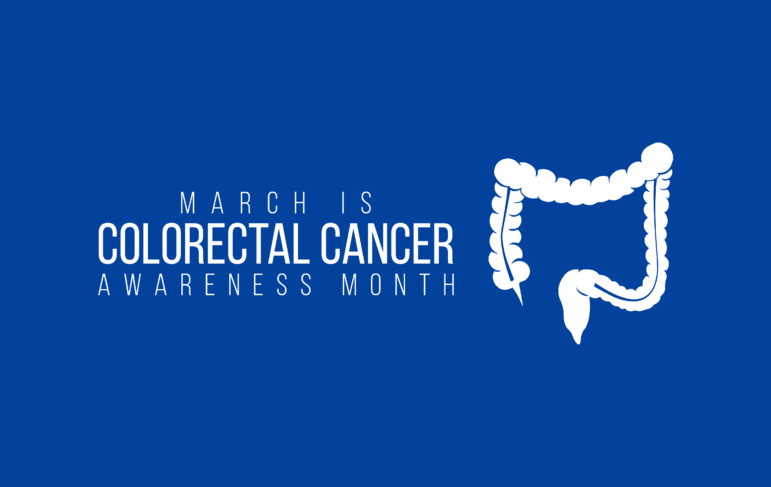Colorectal Cancer Awareness Month
March is Colorectal Cancer Awareness Month. Colorectal cancer is the cancer of the colon or rectum, and depending on the starting point, it can be called colon cancer or rectal cancer. It is the second most common type of cancer in men and women combined. Since the cancers share many similarities, they are grouped together. Most of the time, colorectal cancers start as growths known as polyps in the inner lining of the colon or rectum. Not all polyps become cancer, but polyps that do turn into cancer usually take many years. There are multiple types of polyps, some of which turn into cancer. Adenomatous polyps (adenomas) can sometimes turn into cancer, so they are know as a pre-cancerous condition. Hyperplastic and inflammatory polyps are also possible, but they are not precancerous. They do need to be monitored more often if they are larger than 1 cm though. Sessile serrated polyps and traditional serrated adenomas are also monitored because like adenomas, they have a higher risk of turning into cancer. Colorectal cancer is also more likely in people who have polyps larger than 1 cm, have more than three polyps, or have dysplasia, which is an abnormality either found in polyps or the colon or rectum.
Most colorectal cancers are adenocarcinomas. This cancer starts in cells that make mucus that lubricates the colon and rectum. Most of the time, doctors speaking about colorectal cancer are speaking about adenocarcinoma. There are other types of colon cancers that are less common. These include carcinoid tumors (hormone making cells), gastrointestinal stromal tumors (interstitial cells of Cajal), lymphomas (immune system cells), and sarcomas (start in blood vessels, muscle layers, or other connective tissue in wall of colon or rectum, but very rare).
There are risk factors for colorectal cancer that are changeable and there are some that are not. One of the unchangeable risk factors includes being older. People over the age of 50 are more likely to develop the cancer. Another factor is a history of adenomatous polyps. People who grow these polyps are at a higher risk, especially when they show dysplasia. Racial and ethnic backgrounds can also increase risk. Native American and Alaska Native people have the largest amount of colorectal cancer cases, just above African American men and women. Ashkenazi Jews are also at a higher risk and have one of the highest colorectal cancer risks of any ethnic group. People who have type 2 diabetes are also at an increased risk. Both colorectal cancer and type 2 diabetes share some of the same risk factors, but even when the risk factors are removed, people with type 2 diabetes still have an increased risk of the cancer.
Inflammatory bowel diseases like ulcerative colitis or Crohn’s disease are also a risk factor. When people have inflammatory bowel disease that goes untreated, they develop dysplasia, which then leads to cancer. Family history of colorectal cancer or adenomatous polyps can also increase your risk. Around one in three people who have colorectal cancer have a family member who also had it. Different inherited syndromes (5 percent of total cases) also pose a risk to colorectal cancer. The most common syndromes include Lynch syndrome, which is an inherited defect in either the MLH1, MSH2, or MSH6 gene. The genes affected repair damaged DNA. The other most common syndrome linked to colorectal cancer is familial adenomatous polyposis. The disease is caused by genetic mutations on the APC gene inherited from parents. The syndrome leads to hundreds or thousands of polyps growing in the colon or rectum starting at around 10 to 12 years old. Cancer can then develop in one of these polyps. People can have their colon removed to prevent cancer from developing. People with this syndrome are also at a higher risk of developing stomach, small intestine, pancreas, liver, and other organ cancers. Other rare syndromes including Peutz-Jeghers (have polyps called hamartomas caused by STK11 gene mutations) and MUTYH-associated polyposis (leads to many colon polyps because of MUTYH gene mutations.)
Risk factors that people can change include being overweight; not being physically active; and eating certain diets that include red meats, processed meats, and meat cooked at high temperatures. Having low levels of vitamin D also increases risk. People who smoke, especially for a long time, are at a higher risk. Moderate to heavy alcohol use is linked to colorectal cancer, but light to moderate alcohol use can also increase your risk. Exposure to carcinogens like asbestos is also a risk factor. Asbestos can either be inhaled or ingested and can then travel to the colon and rectum, where the body cannot remove the fibers. Over time, asbestos fibers can cause DNA changes in cells, leading to colorectal cancer.
Treatment for colorectal cancer depends on the stage that it is caught. If polyps are found during a colonoscopy, they can easily be surgically removed by the doctor with a polypectomy. The best option for colon cancer treatment is surgical resection, where the cancer is removed surgically. The procedure is called an endoscopic mucosal resection. Special tools are used to remove larger polyps and a small part of the colon lining. If the surgeon cannot remove the cancer with endoscopic mucosal resection, laparoscopic surgery is performed. Small incisions are made in the abdominal wall and small instruments are used to remove the cancer. If the cancer is more advanced, the surgeon can perform a partial colectomy. The cancer is removed with a small amount of normal tissue surrounding the cancer and the bowel is reconstructed so normal bowel function is close to normal as it can be. If the cancer is removed and the cancer has not spread to the lymph nodes or other parts of the body, the patient does not need any more treatment. If the cancer spread, chemotherapy is usually recommended by doctors. After surgery, patients are monitored in three-to-six-month intervals for three years and six-to-12-month intervals after that. Colonoscopies are also done one year after surgery and every one to three years after that.
Chemotherapy can also be used at different stages of colon cancer including before surgery to shrink the tumor. It can also be given after surgery if the cancer has spread. Chemotherapy is also used to kill cancer cells that have spread throughout the body, reducing the risk of reoccurrence. Radiation therapy can be used as well where high levels of radiation from X-rays or protons are administered to kill cancer cells or relieve symptoms. Chemoradiation, where chemotherapy and radiation are used together, is also a possibility. They work together to be more effective against cancer cells. Targeted drug therapy can be useful as well. Drugs that target specific abnormalities in cancer cells are given, which helps kill cancer cells. Immunotherapy can also be used, where immune system boosting drugs help the immune system kill cancer cells.
Screening is the most important way to prevent colon cancer. If it is caught early or another precancerous condition is found, being monitored can help reduce your risk of dying from colorectal cancer. Monitoring for symptoms can also be helpful. Some common symptoms can include blood in the stool; persistent unusual bowel habits like constipation or diarrhea; stomach pains, aches, or cramps that do not go away; and losing weight for no reason. If you experience any of these symptoms, especially if you have a family history or have any of the above risk factors, seek medical advice from a doctor. Receiving screening can be the difference between surviving the cancer and dying.
If you have colorectal cancer or another cancer like mesothelioma and believe you worked with asbestos, contact is today to see if you could be entitled to compensation. Call 412-471-3980 or fill out our contact form to speak to a member of our team. We will help you determine if a lawsuit is right for you.




